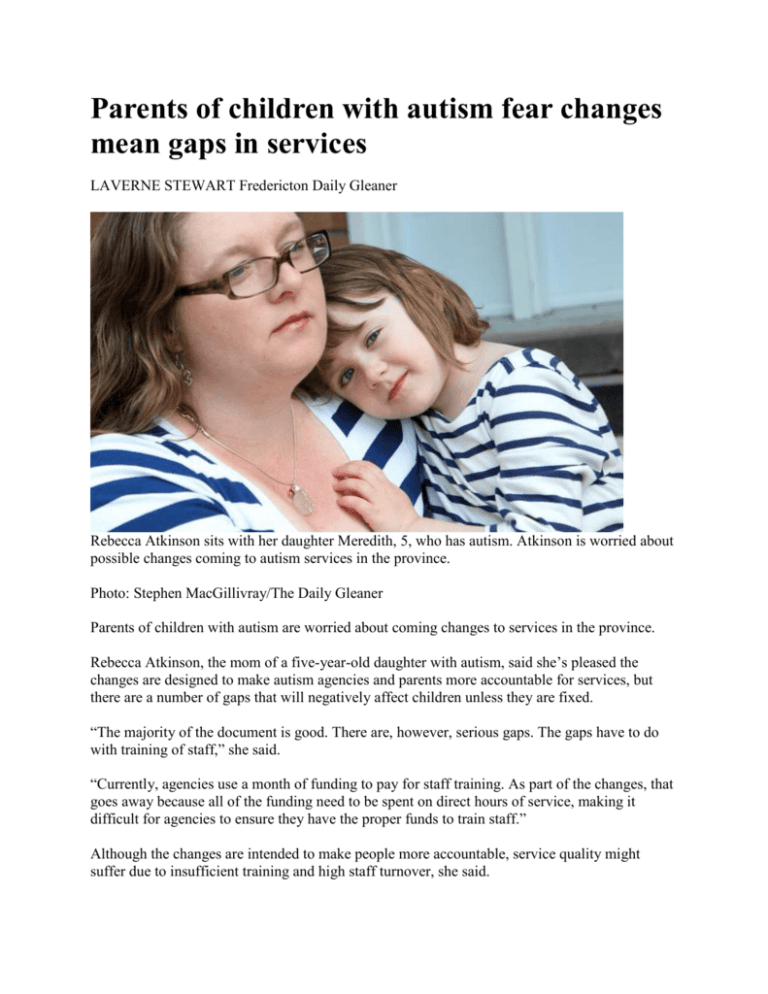
Parents of children with autism fear changes
mean gaps in services
LAVERNE STEWART Fredericton Daily Gleaner
Rebecca Atkinson sits with her daughter Meredith, 5, who has autism. Atkinson is worried about
possible changes coming to autism services in the province.
Photo: Stephen MacGillivray/The Daily Gleaner
Parents of children with autism are worried about coming changes to services in the province.
Rebecca Atkinson, the mom of a five-year-old daughter with autism, said she’s pleased the
changes are designed to make autism agencies and parents more accountable for services, but
there are a number of gaps that will negatively affect children unless they are fixed.
“The majority of the document is good. There are, however, serious gaps. The gaps have to do
with training of staff,” she said.
“Currently, agencies use a month of funding to pay for staff training. As part of the changes, that
goes away because all of the funding need to be spent on direct hours of service, making it
difficult for agencies to ensure they have the proper funds to train staff.”
Although the changes are intended to make people more accountable, service quality might
suffer due to insufficient training and high staff turnover, she said.
Another problem, she said, is that children will be required to attend 95 per cent of their therapy
sessions.
Often, children with autism have a greater chance of having physical challenges, gastrointestinal
issues, seizures, allergies and lower immunity. As a result, they are frequently ill and need to stay
at home.
Should a child miss more than three days over a three-month period, the agency loses
corresponding funding.
Atkinson said the policy is too vague and does not offer specifics to indicate if there will be
exceptions permitted for missed attendance.
An online petition demanding the Alward government amend the mandatory attendance rate for
young children receiving autism therapy is gaining support.
Since the petition started on June 5, more than 683 people have signed it.
Atkinson said autism agencies and the government are still talking. Last week, she and other
parents organized a meeting in Fredericton where government representatives answered their
questions, she said.
“We got a lot of answers and we also confirmed there are some gaps like training and staff pay
that aren’t being clarified,” she said.
“We need to make sure there is continued open dialogue between the agencies, government and
parents and that there is a hard date for training commitments from the government. We are
definitely holding everyone accountable.”
Atkinson said there are six autism agencies in the province and all are using their own service
provision models.
Danielle Pelletier, program director of Autism Intervention Services in Fredericton, said she
understands that funding isn’t being cut, but the way that it’s being administered is changing.
“Under the changes, the agency will be mostly operating as it is presently,” she said. “It is
business as usual for the agency. Over the next three months, we will gather data and be
communicating with the government. For sure, I don’t want to see a reduction to services. That’s
not my goal. I understand parents are concerned. If they have any concerns, they should talk to
their government representatives.”
Pelletier said she needs to gather more information from the government and is still in
negotiations about the issue.
She said she senses there is a commitment from the province to preschool autism intervention
services.
Recently, the New Brunswick government defended itself against the growing number of
complaints over changes to autism intervention services for preschool children.
The Tory government’s changes to the Standards for Agencies Delivering Intervention Services
for Preschool Children with Autism Spectrum Disorder comes into effect on July 1.
In an earlier interview, Education Minister Marie-Claude Blais wanted to set the record straight.
“I want to make it clear: there are no cuts ... We want our stakeholders and everybody to be more
efficient and we’re doing it to provide better care for the children,” Blais said.
However, behavioural intervention specialists have said that funding to train new employees is
being lost, along with the elimination of human resources services, cuts to funding for instructors
teaching group classes and cuts to funding for staff preparation time.
Through government contracts, children are funded for 20 hours of applied behaviour analysis
therapy a week and employees are paid through that funding.
Blais said the government is protecting that 20 hours of therapy per week, and making children
the priority for public money.
“We want to make sure that the 20 hours dedicated to the services go directly to the children,”
she said. “There is no cut in services, not at all. It is quality assurance to ensure that all of the
money and the services go directly on intervention with the children.”
With files from Chris Morris
Copyright © Brunswick News. All rights reserved.







